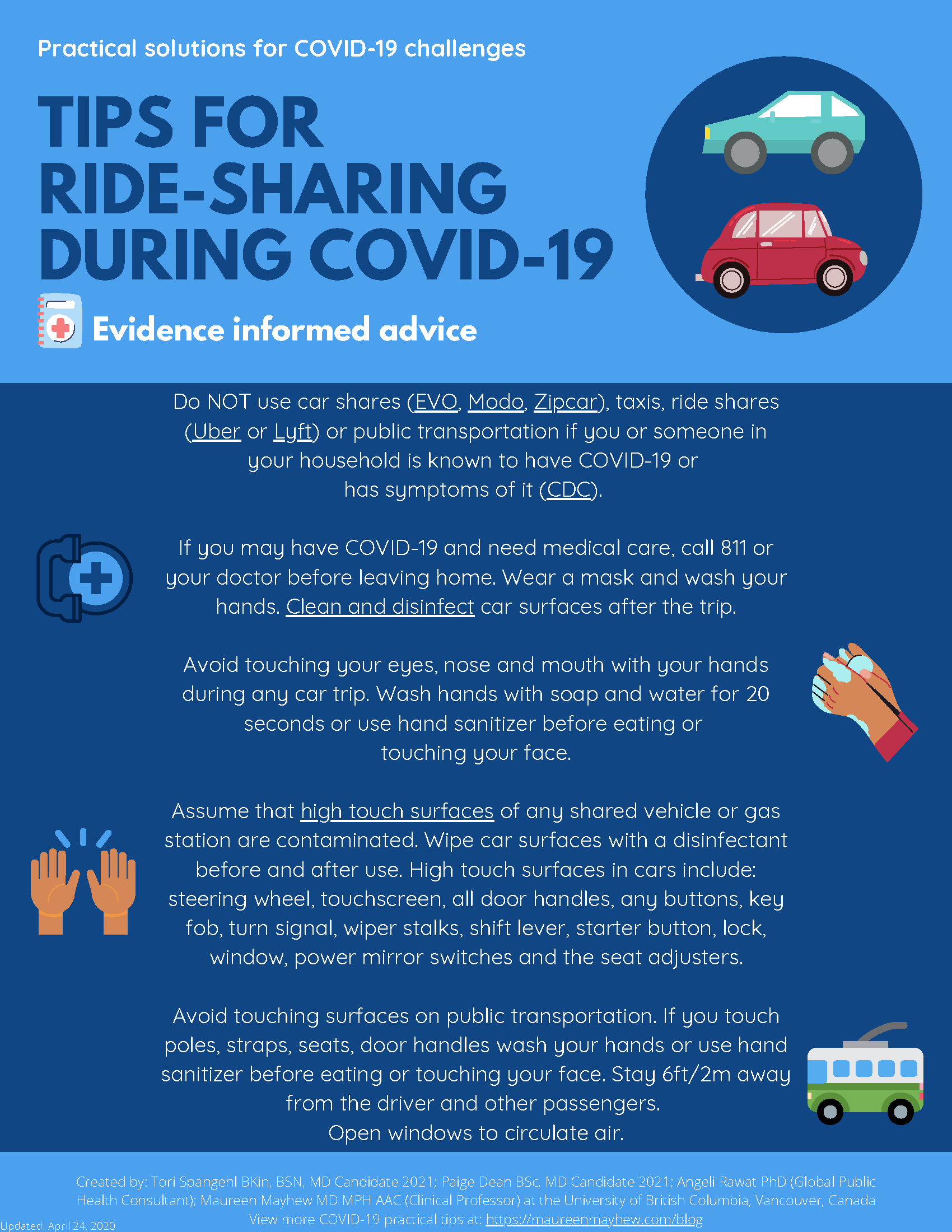Covid-19: Practical Tips for Ride Sharing
Any Type of Ride Sharing (car share, taxis, ride-hailing, private vehicle)
Do NOT use car shares, taxis, Uber or Lyft if you have been diagnosed with COVID-19, are exhibiting symptoms that could be COVID-19 or are living with someone who is sick with COVID-19.(EVO; Modo; Zipcar; CDC )
Assume that all surfaces in the vehicle are contaminated because you don’t know when they were last cleaned. “High-touch” surfaces include the steering wheel, centre touchscreen, door handles and any buttons, the grab handle to close the door; the key fob; the turn signal and wiper stalks; shift lever; starter button; lock, window, and power mirror switches; and the seat adjusters, whether power- or manually-adjustable.
Avoid touching your eyes, nose and mouth with your hands for the duration of the trip. Afterward, wash hands with water and soap for at least 20 seconds.
Maintain as much space as possible between the driver and passengers.
Drive with windows open.
At the gas station, remember that gas pumps, buttons and door knobs are considered high touch points. Use sanitizer or wash your hands after filling up.
Consider wearing a face covering. If used, they must be worn and disposed of properly. Otherwise, they can be a source of disease transmission. Information regarding risks and benefits of face masks is evolving.
Car Shares (short-term rentals for short trips e.g. EVO; Modo; Zipcar)
Car share companies continue to operate for essential trips during COVID-19.
Car share websites describe that cleaning and disinfection of vehicles have been stepped up particularly for high contact surfaces but it is prudent to assume that all high contact surfaces are contaminated because others may have used the vehicle since it was last cleaned.
Bring wipes or hand sanitizing products to clean all high touch surfaces before you get in and when you leave. Leave doors and windows open until dry. Throw the used supplies in the garbage. Don’t leave them in the vehicle.
Your Private Vehicle
If you are symptomatic for COIVD-19, stay home in isolation. If you use your car to seek medical care, telephone the facility in advance and use a mask and gloves. After the trip, all car surfaces must be cleaned and disinfected.
Under specific experimental conditions which are different from those in your car, COVID-19 disappears at different rates from different surfaces. Frequently clean high touch points in your car with a disinfectant to disrupt the transmission of COVID-19 to other drivers and passengers.
Public transport
Use public transport if it is your only means of transportation. COVID-19 is known to be transmitted from person to person through coughing, sneezing, close contact with a sick person or from touching a contaminated surface and then touching your eyes, nose or mouth.
BC transit continues to provide transportation and has implemented some enhanced measured with regards to cleaning and limiting the number of passengers.
Maintain physical distancing wherever possible while on public transport: sit more than 6ft/2m from other passengers.
Avoid touching surfaces. If you do touch poles, straps, doors, etc wash your hands or use hand sanitizer.
Individuals may choose to wear face coverings to protect others. If used, they must be worn and disposed of properly. Otherwise, they can be a source of disease transmission. Information regarding risks and benefits of face masks is evolving.
Created by: Tori Spangehl BKin, BSN, (MD Candidate 2021); Paige Dean BSc, (MD Candidate 2021); Angeli Rawat MPH PhD (Global Public Health Consultant); Maureen Mayhew MD MPH AAC (Clinical Professor) at the University of British Columbia, Vancouver, Canada

